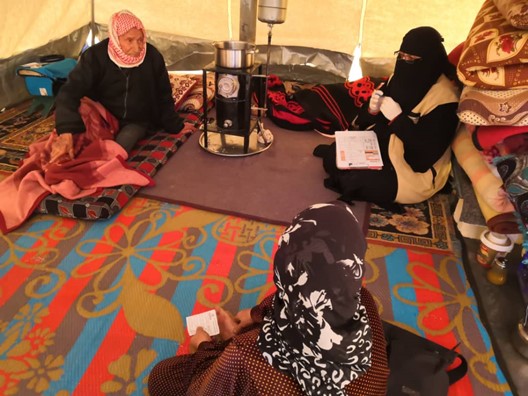Challenging the misconceptions about coronavirus - Abu Fawaz's story

Displaced older people in northern Syria have been uprooted by the war and now live in informal refugee camps. These sprawling, overcrowded camps lack sanitation and basic necessities such as water, electricity and sewage works, meaning illnesses like coronavirus are hard to control. After so many years of war, health supplies in the region are limited. But communication is also poor – and not all older people are aware of the risks.
We’ve worked with our partner in Syria, SEMA, to support community health teams and equip mobile health units. The community health teams have been reaching out to older people in the Idlib region to make them aware of the threat of coronavirus and help them stay safe.
One community health team, based at the Al-Dana Mobile Clinic in the Al Kariya Teneye camp, told us that older people living in the camp were pleased and relieved to have met them. During their visits to the camp, they met Uncle Abu Fawaz, 67, who welcomed them into the tent where he lives with his wife, Aunt Umm Fawaz.
The team introduced themselves, explaining that it is their role to visit the camps to raise awareness of good hygiene practices and how to prevent COVID-19, and in particular with older people. They began to explain the risks of coronavirus, but Abu Fawaz was surprised to hear this, protesting:
“We are in the camps, coronavirus did not come to us.”
But the team explained to him the reality – that the virus was indeed present in the region, spreading widely, and those living in the camps were particularly at risk – with the dense population, congested camps, lack of sterilisation tools and scarcity of medical supplies.
They explained to Uncle Abu Fawaz and his wife that the virus is particularly dangerous for older people, with the immune system weakening with age. They told them it is important they wear a mask when leaving the tent, or having others over, and that they should avoid shaking hands. They also told them to avoid mixing with anyone showing symptoms or going to crowded places.
Both Uncle Abu Fawaz and his wife have chronic diseases, so the team advised them to keep taking their medication regularly as per the doctors prescription. The couple was pleased to learn about the medical services provided by the mobile clinic, and the team were able to make a referral for Uncle Abu Fawaz to be examined by a doctor at the clinic, with any medication necessary would be provided.
You can learn more about how we are supporting SEMA to protect older people in Syria from coronavirus on our Syria in focus page:
Help us to continue supporting older people around the world
Whether with better healthcare, a secure income or life-saving aid – your gift could help change lives.
Read more stories from the ground
Read more of the latest news and stories on our work in combating the coronavirus in low to middle income countries.
 Follow us on social media
Follow us on social media
Keep seeing our stories or ask us a question - connect on Facebook and Twitter.
